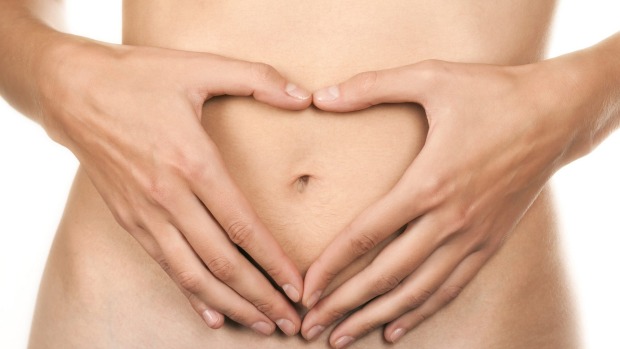
Gut feeling: where our emotions lie? Photo: Getty Images
Intuitively we know our feelings are linked with our guts.
We have “gut instincts” or “gut feelings” and “butterflies in our tummies”, we become a “blubber guts” or “sick to our stomachs” when we’re upset.
Emerging science shows that our gut instinct is correct.
A new paper, published in The Journal of the American Medical Association, explores whether gut feelings really come from the gut.
A growing body of research from other laboratories shows the significance of the relationship between the gut microbiota, stress and anxiety-related behaviours, Friedrich writes.
One recent study showed that stress-sensitive rats that lacked gut microbiota (the community of 100 trillion-odd cells found in the gut, including bacteria), showed an increase in anxiety-like behaviour.
This study came after a separate, game-changing study, which found that gut bacteria affect the stress response and brain chemistry and elevate stress hormones in mice.
Separate studies have discovered a link between gut bacteria and depression.
One 2011 Irish study, authored by neuroscientist John Cryan, found that feeding healthy rats a strain of the bacterium Lactobacillus rhamnosus (found in some yoghurts) cheered up anxious and depressed mice.
Additionally, two different gut bacteria have been shown to produce “feel good” molecules, such as dopamineand gamma-aminobutyric acid (GABA).
While it is an exciting area of research, and the connections are intriguing, there are several shortfalls.
Firstly, few studies have been done on humans.
“The field is still in its infancy, and there remains healthy scepticism as to whether recent work may have translational potential for treating anxiety and depression in humans,” Friedrich says.
The addition of probiotics (living bacteria) have been found to make a huge difference for children, but there are still questions about how much difference they can make for adults.
Besides, researchers are still trying to figure out exactly what environment constitutes a “healthy” gut in the first place.
“Genetic and environmental factors mean that there may be significant variability in gut composition from person to person,” explains Sarah Dash, from Deakin University’s School of Medicine.
Generally, speaking, Dash says that a “healthy” gut means a diversity of bacteria.
So where does that leave us?
David Topping, the chief research scientist at CSIRO, says the agency has been studying the relationship between fibre and a happy, healthy gut and found it is incredibly important.
“There are many types of fibre, but they can be broadly broken down into two types: fermentable and non-fermentable,” he explains. “Fermentable has been shown to be an excellent laxative.”
Non-fermentable, on the other hand, is the type of fibre off which the bacteria in our bellies feed.
“Feeding the bacteria seems to be making all the right changes to protect you,” he says.
Non-fermentable fibre can be found naturally in whole grains, stone-ground cereals, bananas, brown rice, legumes, pulses and barley.
As well as these, probiotics (found in such foods as unsweetened yoghurt, kefir, and kimchi) contribute to a healthy gut, Dash says, as do flavonoids (found in brightly coloured fruits, vegetables, and red wine).
Limiting processed foods, booze (a splodge of red wine aside) and sugars are also important as they can upset the delicate balance of our guts’ ecosystem.
Dash also says that some evidence suggests that exercise may increase the diversity of bacteria living in the gut.
Separate to this, there is the ever-growing probiotic supplement market.
Topping is on the fence about supplements, saying that he does not take any and the results are inconsistent.
“I don’t think anyone has done the trials yet [to confirm their effect],” he says.
Dash says there is “some support for the benefits of probiotic and prebiotic supplements” but “larger, high-quality” studies are needed.
This is in the process of happening says Friedrich. “Efforts are currently under way to substantiate the clinical efficacy of probiotics.”
So far, only certain strains of bacteria have been clinically tested, says dietitian Dr Joanna McMillan.
“For optimum results, it’s really important to choose a strain backed by science,” she says.
“It’s likely you will be familiar with seeing probiotics referred to as ‘ABC’ on yoghurt packaging.
“The “A” is Lactobacillus Acidophilus, the “B” is Bifidobacterium and the “C” is Lactobacillus casei.”
She suggests choosing a yoghurt that contains one billion probiotics per serve. “It can be written on food labelling as 1×109 cfu/g.”
McMillan, who is a fan of probiotic supplements, doesn’t think they will go the same way as vitamin supplements, which can be more harmful than healthy.
“I don’t think probiotics supplements will be the same as vitamins in that taking them is a bit different – you need the actual strains of bacteria, whereas with vitamins you need the complement of nutrients present in a food.
“But there are potentially huge differences between brands and types. I think the way things will go is that we will have far more knowledge about strains and their benefit.
“You can’t just stick any old lactobacillus in a pill and expect good. The number of bacteria present also matters and the frequency you take them – in other words you have to keep taking them. The odd one won’t do any good.”
With that in mind, and with new research revealing just how important is the relationship between our gut and our mental, physical and emotional health, watch this space.
And listen to your gut. As John Cryan, puts it: “Your state of mind might be dependent on your gut.”
